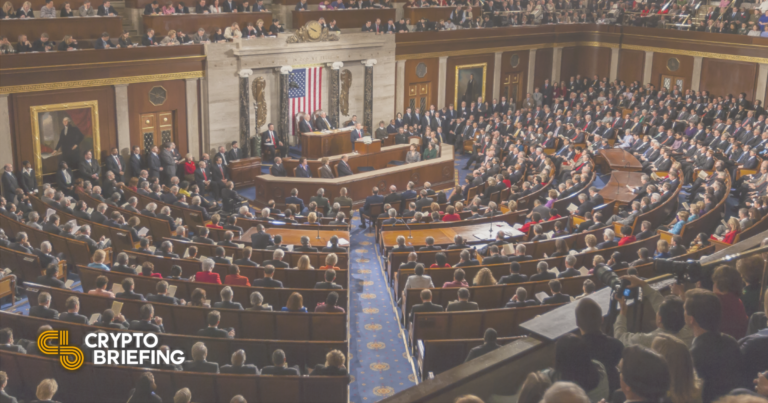Key Takeaways
- The U.S. government is taking an increasingly aggressive stance towards crypto regulation.
- Some of crypto’s strongest allies at Congress are up for reelection this year.
- Crypto Briefing took a close look at five of the most important races in terms of their potential impact on the industry.
Share this article
The last two years have seen the U.S. government take crypto much more seriously, with some congressional representatives proving themselves staunch defenders of the industry. The midterm elections present an opportunity for the space to show them support in return.
Crypto in the Midterm
Midterm elections present an opportunity for American citizens to vote for new representatives at Congress halfway through a President’s term. This year, all 435 seats in the House of Representatives and 35 of the 100 seats in the Senate are up for grabs. The United States midterm elections will be held on November 8.
The 2022 midterm elections may be the most important the crypto space has ever faced. The latest bull cycle propelled Bitcoin to over $69,000 in November 2021 and pushed digital assets closer to the mainstream. Coinbase became the first publicly-traded crypto exchange in the United States. The world’s richest man, Tesla CEO Elon Musk, relentlessly promoted Dogecoin. Digital artist Beeple, for his part, sold one of his NFTs for $69 million at Christie’s. If politicians had not been paying attention before, they were after 2021.
So some U.S. lawmakers have begun debating what place the crypto industry should have within the American financial system. In June, Senators Cynthia Lummis (R-WY) and Kirsten Gillibrand (D-NY) introduced the Responsible Financial Innovation Act, a landmark piece of crypto legislation that aims to overhaul the industry’s relationship with regulators completely. The White House, the Treasury Department, and the Justice Department also recently published comprehensive regulatory frameworks. And only two weeks ago, news surfaced that the House of Representatives had started drafting a bill banning certain algorithmic stablecoins for up to two years. Midterm elections will have a direct impact on who ends up writing it.
The crypto space has allies and enemies alike in Congress, some of which are up for reelection this year. Crypto Briefing compiled a short list of 2022’s most important congressional races from the industry’s point of view.
Tom Emmer vs. Jeanne Hendricks
Rep. Tom Emmer (R) is running against Jeanne Hendricks (D) for Minnesota’s 6th Congressional District. In recent months, Emmer has proved himself one of the crypto industry’s staunchest allies. Most notably, he slammed the Securities and Exchange Commission (SEC) for being “power hungry” and attempting to “jam [crypto companies] into a violation.” Emmer also questioned the Treasury Department’s decision to ban privacy protocol Tornado Cash and asked what kind of recourse law-abiding U.S. citizens could resort to unfreeze blacklisted funds. Emmer’s letter may have been one of the reasons why the Treasury subsequently issued clarifications over the sanctions on its website. Besides vocally advocating for the industry, Emmer has introduced over 10 crypto-related bills since 2019. Emmer is highly favored to win the race.
Ron Wyden vs. Jo Rae Perkins
Rep. Ron Wyden (D) is running against Jo Rae Perkins (R) to represent the people of Oregon in the Senate. Wyden, now 73, has been fighting for Internet freedom since the 1990s—he’s the politician behind the Internet Tax Freedom Act, which for a while protected internet services from being taxed at multiple levels of government. Alongside Sen. Lummis and Sen. Pat Toomey (R-PA), Wyden filed a crypto-friendly amendment to 2021’s controversial bipartisan infrastructure bill to protect certain crypto service providers from being falsely considered “brokers” and regulated as such. While the senators failed to include the entirety of the amendment in the bill, Wyden, Lummis, and Toomey can all be commended for standing up for the crypto industry during a period of high political pressure. Wyden is running for his fifth full term; he is widely expected to win against Perkins.
Tim Ryan vs. J. D. Vance
Rep. Tim Ryan (D), who has been serving as a congressman for Ohio since 2003, is running against venture capitalist J. D. Vance (R) for a seat in the Senate. While the race has gripped national attention, it is interesting for the crypto space because both candidates are openly pro-crypto. Ryan is responsible for introducing, along with Rep. Patrick McHenry (R-NC), the Keep Innovation in America Act, which aimed to provide the crypto industry with the necessary legislative leeway to keep growing in the United States. Ryan notably claimed crypto technologies were “some of the most important innovations to come along in a generation.” On the other hand, Vance disclosed in November 2021 that he owned between $100,000 and $250,000 worth of Bitcoin. Until recently, he was backed by billionaire Bitcoin evangelist Peter Thiel. The race for Ohio’s Senate seat is tight: according to FiveThirtyEight, Ryan is beating Vance by 1.6 points, very much within the margin of error.
Warren Davidson vs. Vanessa Enoch
Another contest in Ohio is between Rep. Warren Davidson (R) and Vanessa Enoch (D), this time for Ohio’s eighth congressional district. Davidson has been raising awareness around cryptocurrencies in Congress since 2016; he has even been dubbed “Crypto Congressman” by Bitcoin Magazine. On numerous occasions, Davidson has taken to Twitter to comment on developments in the crypto industry. When The Economist ran an article accusing cryptocurrencies of being useful monetary vehicles for white supremacists, Davidson wrote back: “Such contempt for #FreedomMoney reveals either a shocking level of ignorance (improbable) or a highly biased agenda (almost certain).” He called the creation of Bitcoin “a rare and amazing feat” and criticized the Trudeau government for freezing the bank accounts of Canadian protesters in Ottawa at the beginning of the year, adding that Bitcoin could only prove a useful countermeasure if people used self-hosted wallets. To that effect, Davidson has introduced the Keep Your Coins Act, which, if passed, would prohibit federal agencies from passing legislation impairing a person’s right to self-custody. Davidson already beat Enoch in 2020, winning almost 69% of the district’s votes; he is expected to win again.
Brad Sherman vs. Lucie Volotzky
Rep. Brad Sherman (D) is facing off against Lucie Volotzky (R) for California’s 32nd congressional district. Sherman has served Congress since 1997; in recent years, he has attained a certain level of fame for his antagonistic stance towards crypto. He has called for a complete ban on cryptocurrencies, arguing that they undermine the U.S. dollar’s hegemony and the U.S. government’s ability to enforce sanctions against enemy states. In a particularly weird congressional session, Sherman stated that the “number one threat to cryptocurrency is crypto. Bitcoin could be displaced by Ether, which could be displaced by Doge, which could be displaced by HamsterCoin, and then there’s CobraCoin—and what could MongooseCoin do to CryptoCoin?” The rant prompted the launch of multiple mongoose-themed coins on Uniswap. While Sherman hasn’t managed to organize proper opposition against the crypto industry, it certainly wouldn’t hurt the industry for Volotzky to fill his seat. However, she has raised much less campaign money than Sherman, and her chances of winning the midterm are considered slim.
Honorable Mentions
Hundreds of congressional candidates have expressed their stance on crypto: some are staunch defenders of the technology, while others criticize it at every turn. Other notable crypto allies include Rep. Brett Guthrie (R-KY), Rep. Darren Soto (D-FL), Rep. French Hill (R-AR), Rep. Glenn Thompson (R-PA), and Rep. Ro Khanna (D-CA), all of which are running for reelection this year at the House of Representatives. For his part, current North Carolina representative Ted Budd (R) is aiming to take a step up into the Senate.
All of these members of Congress have sponsored or co-sponsored important legislative pieces aimed at nurturing the crypto industry in the United States, including the Keep Innovation in America Act, the Digital Commodity Exchange Act of 2022, the Token Taxonomy Act, and the Blockchain Technology Coordination Act of 2021, among many others.
The U.S. government and its many agencies have taken escalating steps toward regulating the crypto industry. The Securities and Exchange Commission (SEC) and the Commodity Futures Trading Commission (CFTC) have shown a willingness to indulge in “regulation by enforcement,” establishing new compliance rules one lawsuit at a time. It has therefore become vital for the industry’s interests to be represented in Congress by as many pro-crypto lawmakers as possible. Vote, donate, inform yourself, and engage with your community—because crypto really is on the ballot this year.
Disclaimer: At the time of writing, the author of this piece owned BTC, ETH, and several other cryptocurrencies.







